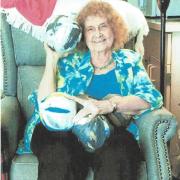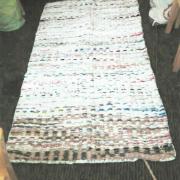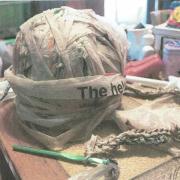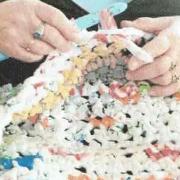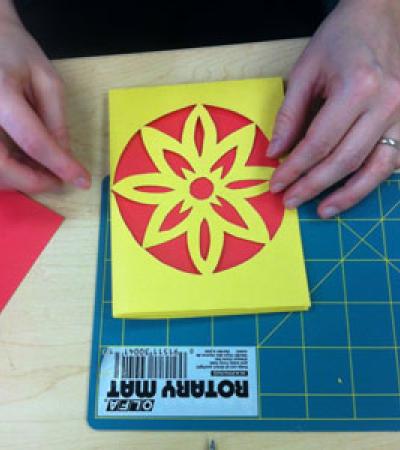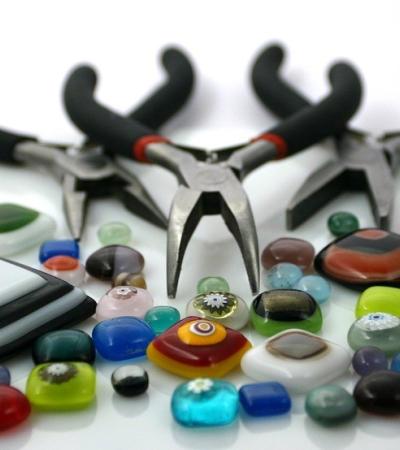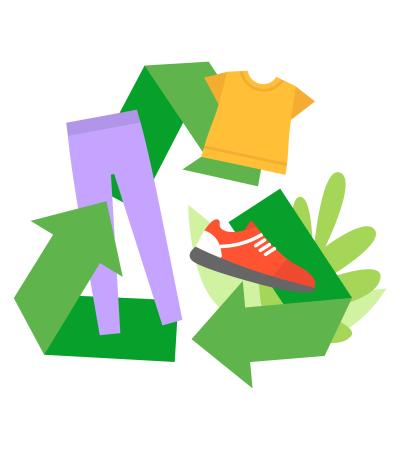Our small branch library runs a volunteer operation in which many of our residents — many of them older or disabled — help to make sleeping mats for the needy and homeless. The process, called "plarning," involves cutting regular plastic shopping bags into strips and crocheting them into mats.
These mats are now in every patrol car in Live Oak, Florida, and hundreds of mats were sent to the panhandle of Florida after Hurricane Michael.
Advanced Planning
I read an article in our local newspaper about a woman making mats for the homeless using plastic bags. I called her and asked how our library could help. She gave a demonstration to library staff.
To make the mats, plastic bags are cut into 4-inch strips and looped together to make plarn, or plastic yarn. The plarn is then crocheted to make the mat. It takes 700 plastic bags to make a 6-foot-tall mat with two-inch straps and carry handle.
Plastic bags are brought into the library. Those donating bags are asked to smooth them out before donating; however, we do accept crushed and wrinkled bags. Sometimes volunteers take the donated bags, cut them into 4-inch strips and then loop the strips together to make plarn balls. Mostly though, we librarians cut these bags into 4-inch strips by using the paper cutter. We place a pile of approximately five bags on the paper cutter, cut off the bags' ends and handles, and then cut the remaining plastic into strips.
The strips are then distributed to patrons to make the plarn balls. We deliver bags of strips to shut-ins and those residing in assisted living facilities. There are at least 15 people (men and women ranging in age from 50 to 95) that loop strips into plarn balls.
These plarn balls are then collected and handed out to those that can crochet (instructions for crocheting the mats can be found under Attachments, at right). In a few weeks a completed mat with pillow is returned to the library.
Marketing
I advertised for donations of smoothed out plastic bags in the local newspaper, the Advent Christian Village newspaper, and on our website. It did not take long for the plastic bags to start arriving. I then advertised for volunteers to make the plarn and crochet mats.
Day-of-event Activity
This is an ongoing activity. We collect the plastic bags 24/7. When the library is open, bags are dropped off or strips picked up. Bags and plarn balls are also left in our book drop, when the library is closed.
Program Execution
In the library I have two large boxes: one for incoming bags being donated, and one for processed plarn (ready to be picked up). I keep cut strips in plastic bags on a counter to be given out.
An unexpected challenge is that our staff cannot cut strips fast enough for those wanting them. We are also running a library and cannot cut strips constantly! One lady in the assisted living facility complained that I didn’t give her enough strips, and another man was perturbed when there were no bags to be picked up.
Being a library and handicapped accessible, we are in a good position for drop-offs and pick-ups. This program has increased attendance and brought new people into the library. It has also helped increase outreach and volunteer hours. While I was writing this section, no kidding, two new people came into the library asking for a plarning demonstration. I was only too happy to oblige.
In less than a year our library has helped to create over 50 mats, and this project has given meaning to the lives of those involved. Many are confined to wheelchairs or are unable to maneuver readily, yet this is something they can do to help others.
Advice
If you do this program be prepared to receive some “nasty” bags. Your staff might complain that the blade on the paper cutter will get dull. Maintenance can sharpen the blade easily.
Supporting Materials
- Feedback (Coming Soon!)
- Programming Librarian Facebook Group

